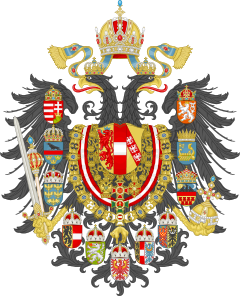music.wikisort.org - Composition
The Volkslied ("National hymn"), WAB 94, is a patriotic song composed by Anton Bruckner in 1882 for a competition for a Hymne für das Deutsche Volk in Österreich (Hymn for the German People in Austria).
| Volkslied | |
|---|---|
| Secular choral work by Anton Bruckner | |
 Coat of Arms of the Empire of Austria | |
| Key | C major |
| Catalogue | WAB 94 |
| Form | Patriotic song |
| Text | Josef Winter |
| Language | German |
| Composed | 1882: Vienna |
| Dedication | Competition for a hymn for the German People in Austria |
| Published | 1932: Regensburg |
| Vocal |
|
History
On 16 October 1881, the Deutsche Zeitung invited submissions for a text für eines sangbares Nationallied (for a singable national hymn). From 1,750 texts entered, Josef Winter's was awarded the first prize. On 1 January 1882 a second invitation appeared for a Hymne für das Deutsche Volk in Österreich (Hymn for the German People in Austria), for men's choir as well as for voice and piano. Bruckner, as one of the 1,320 participants, sent a sample of both settings. No prize was awarded for any of the submissions.[1][2]
The manuscripts are stored in the archive of the Österreichische Nationalbibliothek and the Bibliothèque nationale de Paris.[1] The two settings were first published in Band III/2, pp. 191 and 192 of the Göllerich/Auer biography.[2] The setting for voice and piano is issued in Band XXIII/1, No. 6 of the Gesamtausgabe.[3] The setting for men's choir is issued in Band XXIII/2, No. 32 of the Gesamtausgabe.[3]
Lyrics
The song uses Josef Winter's lyrics:
Anheben lasst uns allzusamm' |
Let us raise together |
Music
There are two settings of the Volkslied WAB 94:
- A 34-bar-long setting for voice and piano, which uses the first strophe of Winter's text.[2]
- A 67-bar-long setting for men's TTBB choir, which uses the six strophes of Winter's text.[4]
Discography
Setting for voice and piano
There is no commercial recording of this setting. A live performance by Raymond Armstrong (1 April 2017)[5] is stored in the Bruckner Archive.[6]
Setting for men's choir
There is a single recording of this setting:
- Thomas Kerbl, Männerchorvereinigung, Weltliche Männerchöre – CD: LIVA 054, 2012 – 1st strophe only
- Note
- The Volkslied has been performed at the Brucknerfest 2022 (Brucknerfest 2022 - Krieg und Frieden (29-09-2022)). A recording is available in the Bruckner Archive.[7]
References
- U. Harten, pp. 469-470
- C. van Zwol, p. 718
- Gesamtausgabe – Weltliche Chöre
- C. van Zwol, p. 729
- University of Oxford: 1 April 2017 evening concert in Hertford College Chapel
- Bruckner Archive
- The Bruckner archive
Sources
- August Göllerich, Anton Bruckner. Ein Lebens- und Schaffens-Bild, c. 1922 – posthumous edited by Max Auer by G. Bosse, Regensburg, 1932
- Anton Bruckner – Sämtliche Werke, Band XXIII/1: Lieder für Gesang und Klavier (1851–1882), Musikwissenschaftlicher Verlag der Internationalen Bruckner-Gesellschaft, Angela Pachovsky (Editor), Vienna, 1997
- Anton Bruckner – Sämtliche Werke, Band XXIII/2: Weltliche Chorwerke (1843–1893), Musikwissenschaftlicher Verlag der Internationalen Bruckner-Gesellschaft, Angela Pachovsky and Anton Reinthaler (Editor), Vienna, 1989
- Cornelis van Zwol, Anton Bruckner 1824–1896 – Leven en werken, uitg. Thoth, Bussum, Netherlands, 2012. ISBN 978-90-6868-590-9
- Uwe Harten, Anton Bruckner. Ein Handbuch. Residenz Verlag, Salzburg, 1996. ISBN 3-7017-1030-9.
External links
- Volkslied, WAB 94: Scores at the International Music Score Library Project
- Volkslied C-Dur, WAB 94 – Critical discography by Hans Roelofs (in German)
Другой контент может иметь иную лицензию. Перед использованием материалов сайта WikiSort.org внимательно изучите правила лицензирования конкретных элементов наполнения сайта.
WikiSort.org - проект по пересортировке и дополнению контента Википедии